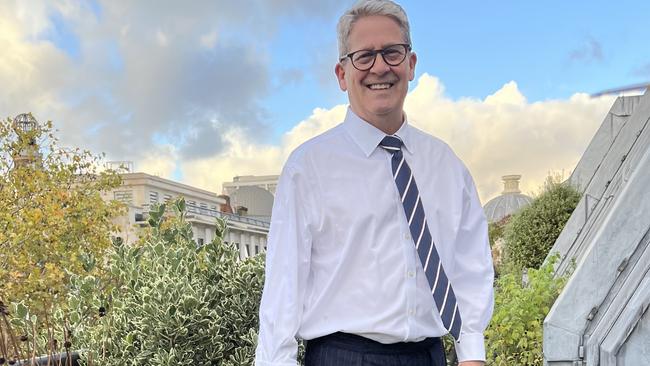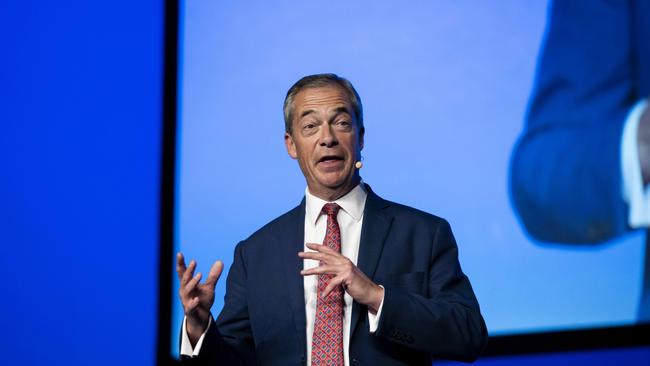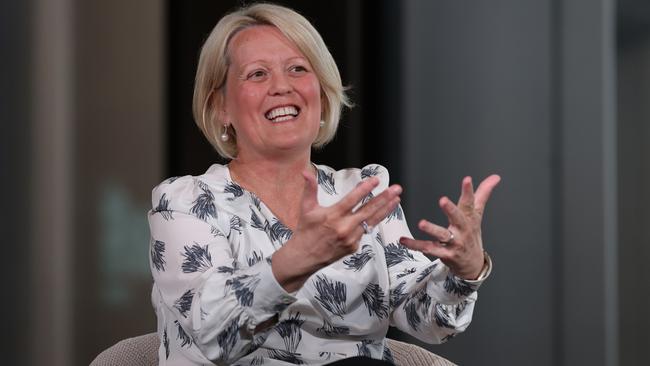Coutts dumps Australian CEO Peter Flavel over Farage ‘de-banking
South Australian Peter Flavel has resigned as Coutts CEO, the latest casualty of an dossier scandal which has trashed the bank’s three-centuries old reputation.

South Australian Peter Flavel has resigned as Coutts chief executive, the latest casualty of an dossier scandal which has trashed the bank’s three-centuries old reputation.
Mr Flavel has followed Alison Rose, the chief executive of Coutts’ parent company NatWest out the door, after failing to stem widespread community anger about the “de-banking” of clients, the most high profile being Brexit campaigner Nigel Farage.
Mr Flavel’s exit statement said he bore ultimate responsibility for the bank falling below its high standards of personal service.
Coutts shut Mr Farage’s account earlier this year because of his political views – including his tweeting of support of Novak Djokovic, Brexit and Donald Trump.
“In the handling of Mr Farage‘s case we have fallen below the bank’s high standards of personal service,’’ said Mr Flavel, who had been on an estimated salary of A$1.8m overseeing the royal patronage bank which was established in 1692.
“As CEO of Coutts it is right that I bear ultimate responsibility for this, which is why I am stepping down.”

However the bank executives have still not addressed the core concern of why banks could be moral arbitrators and deny account holders a key service.
The share price of the bank continues to struggle to make ground as furious Britons express anger about “arrogant” and “woke” bankers and their eye-watering pay and bonuses.
Ms Rose, on A$10million salary a year, may still walk away with a hefty severance deal of a year’s pay because she agreed to resign by mutual consent, rather than being sacked.
It is unclear if Mr Flavel, believed to be on a salary of A$1.8m a year, will be also rewarded on the way out.
The chairman of Nat West, Sir Howard Davies, is now under pressure after giving unbridled support of his executive team, including a comment of it being a “sad time” when Ms Rose, 54, resigned three days ago after an emergency board meeting which started at 11pm.
Only hours before, the prime minister and the chancellor had expressed surprise that the board had given her their full support.
The Financial Services Authority is now investigating if any of the bank executives, particularly Ms Rose, broke data protection laws.
The furore began earlier this month when Mr Farage made public his concerns about the closure of his bank account and Ms Rose told the BBC it was because he did not have enough money.

Explosive internal bank memos then obtained by Mr Farage showed this was untrue, and his account was closed because he held views “at odds with the banks position as an inclusive organisation’’.
Earlier this week Ms Rose admitted to a “serious error of Judgement” in discussing Mr Farage’s account with a journalist.
On Thursday British Prime Minister Rishi Sunak sidestepped questions about whether he had full confidence in the chair, Mr Davies.
Mr Flavel’s tenure had been in doubt for a fortnight, after Mr Farage revealed he had not replied to two direct emails about the 40 page dossier compiled by a Coutts committee.
Mr Farage released the emails, including one dated April 19, 2023 which asked Mr Flavel: “I can’t help wonder that there may be some prejudice here … what on earth is going on?”
On Thursday Mr Farage said Mr Flavel had shown “an extraordinary kind of arrogance from a man asleep at the wheel’’.
But the bank had decided to cut Mr Farage’s account – which he had first opened in 1980 – many months before.
Minutes of the Coutts’ wealth reputational risk committee dated November 17 2022 say: “The committee did not think continuing to bank NF (Nigel Farage) was compatible with Coutts given his publicly-stated views that were at odds with our position as an inclusive organisation.”
When he received the committee minutes, Mr Farage said the 40 page document was chilling and confirmed his worst fears, warning the country was sleepwalking towards a China-style social credit system where only those with “correct” views are allowed to fully participate in society’’.
He had said of the dossier: “(it) reads rather like a pre-trial brief drawn up by the prosecution in a case against a career criminal. Monthly press checks were made on me. My social media accounts were monitored. Anything considered ‘problematic’ was recorded. I was being watched”.
Mr Flavel had been the chief executive of Coutts for seven years and had previously been the chief executive of JPMorgan Private Wealth Management in Asia Pacific region.
One of Mr Flavel’s last public duties at Coutts was hosting a cricket discussion featuring former Australian prime minister John Howard and the former British prime minister Sir John Major after the controversial second Ashes test at Lord’s.




To join the conversation, please log in. Don't have an account? Register
Join the conversation, you are commenting as Logout